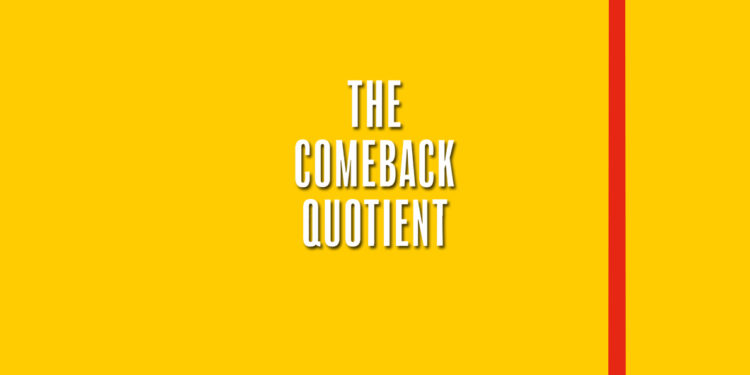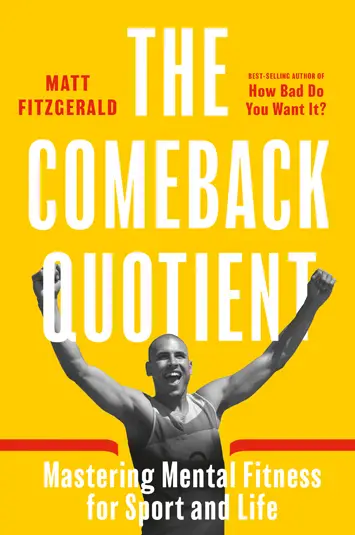The Comeback Quotient by Matt Fitzgerald – Review

By Nigel Armitage
Matt Fitzgerald wants to let us in on an important secret: how is it that some people, specifically certain elite athletes, are able to achieve amazing comebacks against apparently impossible odds? What is it that these people are made of that sets them apart from the rest of us, and what can we learn from them to help overcome the great challenges and setbacks in our own lives? In other words, and referring to a saying Matt returns to again and again, when life gives us lemons, how can we make lemonade?
It turns out that these people are made of the same stuff that we are. What sets them apart is a specific mindset which they’ve nurtured as part of their athletic and personal development. “The most important revelation I had in writing this book was the discovery that […] the special few who prove themselves capable of achieving amazing comebacks are all doing the same thing, going through the same process to get up […] and get moving again, better than before.”
The book sets forth stories and profiles of athletes who have done exactly that and gone on to succeed at an inspiringly high level. And, tellingly, these achievements have sometimes occurred in a different sporting discipline from the one in which they had shown early promise, but which (often cruel) circumstance meant they could no longer pursue. This is an important idea because it lends credence to Matt’s view that what we can learn from these athletes has relevance and value beyond high sporting accomplishment. Athletic prowess in this book can therefore be understood as a metaphor for life generally: “The secret to coming back from defeats and challenges is the same both on the racecourse and off.” The book overall makes for a convincing argument that this is indeed the case.
But what exactly is this specific mindset and how do we go about developing it to make it relevant in our own lives? According to Matt, it’s all about being an ‘ultrarealist’. Faced with a significant setback or barrier, what are the different ways we could respond? It is not uncommon to start off by denying that the setback exists at all – as with a running injury – and then move on to feeling angry about the fact that it does exist. Next might come apathy in the belief that nothing we can do will make any difference to our situation. All the while in this tail-spinning negative mindset, we move further away from making meaningful progress towards resolving the problem.
“Argues its case cogently and engagingly”
 Using the ‘ultrarealist’ approach, we might instead start off by accepting the reality of the setback or injury. Acceptance is about recognising that you have a choice about what to do about the situation. Next, embrace the setback and doing so means that you’re committing to doing something about it. Finally, address the setback by the best means possible, which will vary according to the nature of the setback. All of which is consistent with what might be considered this book’s guiding principle:
Using the ‘ultrarealist’ approach, we might instead start off by accepting the reality of the setback or injury. Acceptance is about recognising that you have a choice about what to do about the situation. Next, embrace the setback and doing so means that you’re committing to doing something about it. Finally, address the setback by the best means possible, which will vary according to the nature of the setback. All of which is consistent with what might be considered this book’s guiding principle:
“You’re in control of the only thing you truly can control, which is your mind, and it feels like freedom.”
Ultrarealism is therefore not a credo of ‘winners and losers’ but of ‘training the mind for success and personal achievement’. It’s a powerful idea, if not a wholly original one, and Matt makes the links himself to individuals and schools of thought in the past who espoused the same set of beliefs, including the Stoics, for example. His interest is born of a desire to put these ideas into practice in his own athletic endeavours and the book also chronicles his exhaustive and (befitting his book’s subject) at times fraught and interrupted training for the formidable challenge of the Santa Rosa Ironman.
The Comeback Quotient achieves its aim of motivating the reader to think differently about life’s setbacks and challenges in whatever form or context they may occur. The book overall argues its case cogently and engagingly. The case studies combine to provide convincing testimony of the potential high value of an ‘ultrarealist’ mindset. This approach ultimately mitigates against the great enemy – persistent doubt about our true capability – which can so easily result in self-sabotage where potential (sporting or otherwise) is never fully realised. Recognising that there is always a choice about how we respond to any situation (however desperate and apparently hopeless) is a first step towards exercising one’s freedom towards overcoming that situation. For these reasons, amongst others in Matt’s well-crafted narrative, this book is deserving of the reader’s time and appreciation.
‘The Comeback Quotient’ by Matt Fitzgerald is published by Aurum, £12.99









